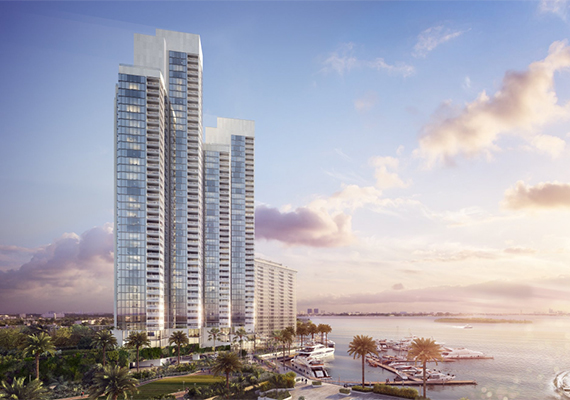A judge has issued mixed rulings in the ongoing litigation pitting Jockey Club residents in North Miami against the developers of the proposed Apeiron at the Jockey Club.
Miami-Dade Circuit Judge John W. Thornton ruled in favor of the developers on one set of grounds, but denied their motion on another, and the case will now head to trial, as the residents continue to try to block the development of the condo and hotel project.
Judge Thornton ruled on Saturday that a 1977 agreement on which the two Jockey Club condominium boards had partly based their lawsuit does not apply to Apeiron. The condominium boards had argued that the 1977 agreement prevented Apeiron from developing the property they own at the Jockey Club.
Yet the judge denied Apeiron at the Jockey Club’s motion regarding a 1995 agreement between the developer and the associations of all three buildings. It essentially gave the buildings easement rights over the complex’s common areas, including its pools and tennis courts, for 99 years.
Glen Waldman, managing partner of Heller Waldman, who represents the residents of two of the three Jockey Club buildings, told The Real Deal the case is now scheduled for trial during a three-week period beginning Feb. 27.
“We have every confidence that the judge will enforce the ’95 agreement that does not have any of the flaws that the court found that existed in the ’77 agreement,” Waldman said. “And if the court finds the ’95 agreement to be binding, we believe it will prohibit them from building, as well.”
Meanwhile, the developers are continuing to seek government approvals. “While litigation is not the path that we would have chosen, we are nonetheless pleased with the outcome thus far,” Muayad ‘Mo’ Abbas, project principal for Apeiron at the Jockey Club, said in a statement. “We now look forward to gaining the county approvals needed to build a first-rate project that will improve the Jockey Club property for future and current residents, alike – which has been our goal from the outset.”
Residents of the Jockey Club condo complex at 11111 Biscayne Boulevard in North Miami filed suit against the developers of Apeiron in March 2016, hoping to block the project from moving forward. The Jockey Club complex has three buildings, built between 1971 and 1982.
In 2015, Apeiron’s development team filed plans for an ultra-modern condo and hotel project that would be built on the Jockey Club’s 13 acres of common grounds. The team, headed by Horst Schulze, Michael Bedner and Abbas, purchased the land for $3.25 million in 2014 and secured a $21 million loan to fund planning costs in December 2015.
But residents of Building I and II, totaling 259 owners, filed suit against Apeiron Miami to stop the project from ever breaking ground. The suit also named the association of Building III — with its 152 unit owners — as co-defendants. Building III has agreed to support the developer in exchange for $10 million, according to the suit.
Waldman had told TRD at the time that bringing an additional 240 units to the complex could jam up traffic — residents have to enter through a gate — and the introduction of new construction in an older complex could bring their property values down, he said.
However, a spokesperson for Apeiron had contended that the project wouldn’t just be delivering condos and hotel rooms: the developer’s proposal included building a five-acre indoor/outdoor health and wellness complex, outdoor pools, new clay tennis courts, plus reconstructing the existing marina with 38 deep-water yacht slips.
The developers said they would also rebuild the entryway to allow for more traffic flow, as well as build a secondary entrance at Northeast 111 Street.
The suit was grounded in a pair of agreements that were made between the Jockey Club’s original developer and the condo associations of the first two buildings. The first, made in 1977, was between the association of Building II and Jockey Club, Inc. According to the suit, the association agreed to stand aside while the developer built a third tower. In exchange, the residents requested that no further residential construction be made in the complex.
The second, made in 1995, was between the developer and the associations of all three buildings. It essentially gave the buildings easement rights over the complex’s common areas, including its pools and tennis courts, for 99 years. The suit alleged Apeiron, as successor to the Jockey Club’s original developer, would break both of those agreements if it build its project.
